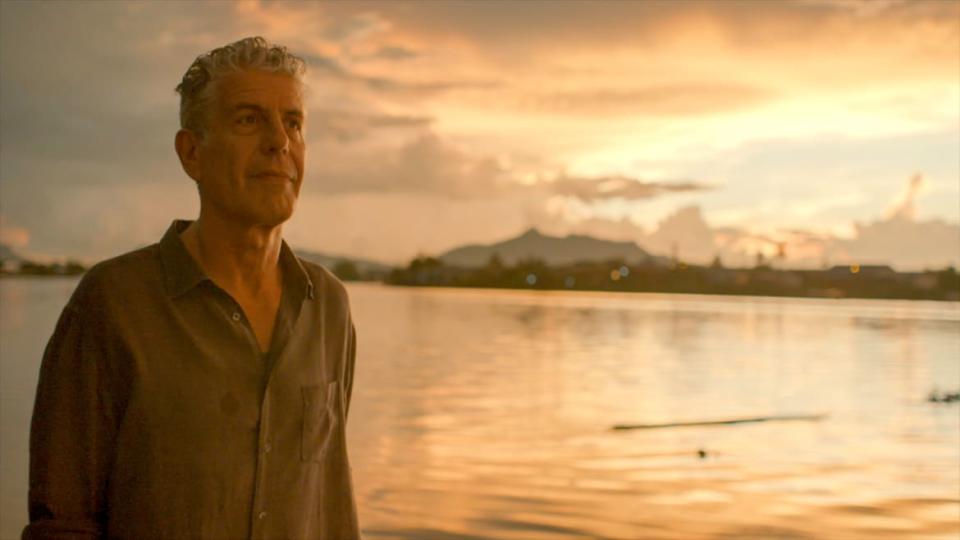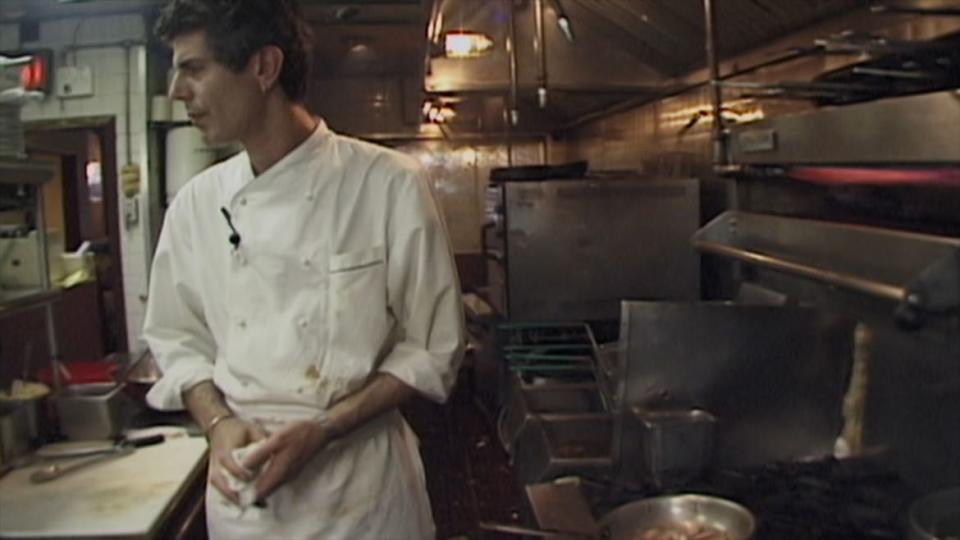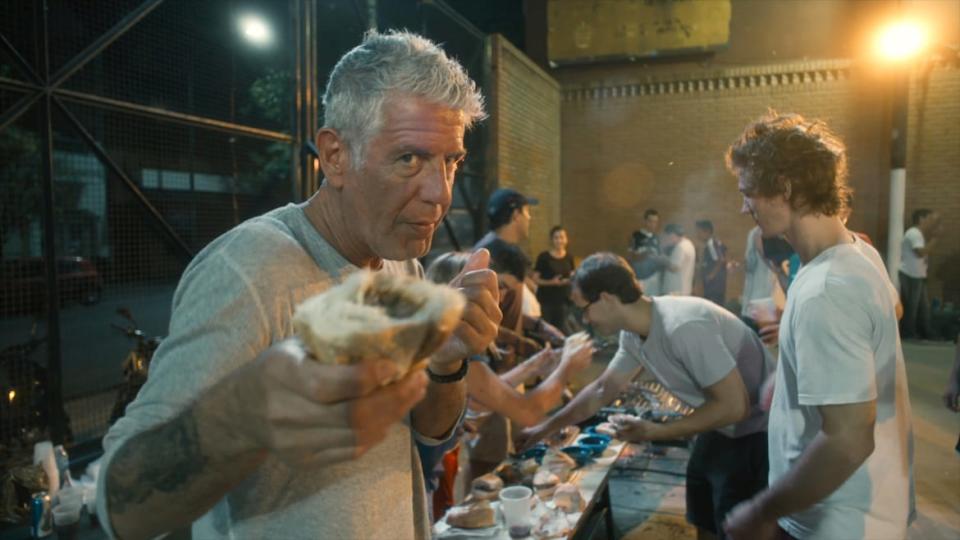The Dark Reality of Anthony Bourdain’s Final Days

There’s a scene early in the new documentary Roadrunner that feels inconceivable to anyone who has spent the past couple of decades watching Anthony Bourdain travel the world.
Hot off the blockbuster success of Kitchen Confidential, his tell-all book about the restaurant industry, Bourdain has been granted his first shot at the type of television show that would ultimately make him a star. But he has no clue what to do.
Seated on the floor of a private room in a traditional Japanese restaurant, Bourdain silently eats his meal as the two women serving it to him nod awkwardly. All he can think to say is, “Oh, wow, spectacular,” and keep chewing. It is a distant cry from the affable, engaged Bourdain who delighted viewers of his later programs, especially No Reservations and Parts Unknown.
Given the opportunity to make his first travel show, called A Cook’s Tour, for Food Network in the early 2000s, Bourdain could have started off with a relatively easy jaunt to Europe. But since he wasn’t sure he’d ever have the chance to do this type of television again, he went all-in on the two places he’d always wanted to visit: Japan and Vietnam.
Anthony Bourdain’s Journey Deep Into the Heart of Trump Country: ‘I Was Utterly Disarmed’
“It became immediately clear he had never traveled,” longtime producer Lydia Tenaglia says of her first meeting with Bourdain in the film, directed by Oscar winner Morgan Neville. Her creative and romantic partner Chris Collins adds, “His travels were in his head.”
“We didn’t know what we were doing,” Tenaglia admits. “He definitely didn’t know what he was doing. And Tony immediately became uncomfortable and awkward.” They quickly discovered that Bourdain was actually quite shy around new people. He had to be encouraged to interact with strangers.
Collins’ assessment after the first day of shooting was, “We’re fucked.”
The rest, of course, is history as Bourdain became one of the most charismatic TV hosts of all time, figuring things out as he went along. One revelation that we see him make in the early part of the documentary is that travel shows could be just as cinematic as his favorite films, finding inspiration in Apocalypse Now for his episode about the Mekong River.

Anthony Bourdain in Morgan Neville’s documentary, Roadrunner.
There is much joy to be found in Roadrunner as we watch Bourdain gain confidence and reach new creative heights, but there is also a pervading darkness just around the corner as the film makes its way through its two-hour running time. We know that time is running out for the man who took his own life at the age of 61 three years ago this June.
Throughout the film, we hear from dozens of people who knew Bourdain intimately. There are interviews with his closest friends like chef Eric Ripert, who discovered his body in that French hotel room, as well as the producers, directors, cinematographers and camera people who spent decades collaborating on his TV projects. There’s even a sit-down with his ex-wife and mother of his only child, Ottavia Busia, who says this is the last time she will ever speak publicly about him.
But there is one person notably absent from the interviews: Asia Argento. Bourdain’s final romantic partner dominates the last act of the documentary just as the film suggests she overtook his life near the end.
We first meet Argento seated across from Bourdain at a small family restaurant in Rome during a scene for Parts Unknown’s eighth season finale. The people in his life could see that he was falling in love and developing what seemed to be a singular focus on the Italian actress.
The musician Josh Homme says Bourdain was actively searching for something “feral and wild.” His close friend Alison Mosshart, who fronts The Kills, reveals that Bourdain wrote to her in an email that he knew the relationship would “end very, very badly.”
At a certain point, Bourdain decided he was done making Parts Unknown. “I can’t live my life like this anymore,” he told his producers. “I’m done. I’m done with this, I’m done with you people. Every band comes to an end. It’s time for us to break up and go our separate ways.”
After essentially destroying the family he had with his ex-wife and daughter, he told his team that he wanted to make sure he didn’t ruin things with Argento as well. They gave him their blessing to move on from the show, but ultimately he couldn’t give it up.
It wasn’t long after that when the crew went to Hong Kong to shoot what ended up being the episode that broke Parts Unknown.
The show’s longtime director got sick at the last moment and Bourdain saw an opportunity. Argento would direct the episode. His usual crew had no choice but to go along with it, but very quickly everything started to fall apart as she upended the process they had been perfecting for years.
We see Argento call “cut” as Bourdain is interviewing a pair of asylum-seekers over a late-night meal. They reset and shoot the scene again as if it’s take two of a fictional movie and not the type of real, heartfelt conversation for which the show was known. “He would have never, ever done that,” producer Helen Cho recalls with a combination of disappointment and disgust.
On top of hiring his girlfriend to direct, the host decided to fire his veteran cinematographer Zach Zamboni—who won three Emmy Awards for his work with Bourdain—after he clashed with Argento about the shoot. He brought in the legendary Wong Kar-wai collaborator Christopher Doyle to replace him. “When Tony fired Zach, it was a huge red flag,” Cho says. “Because if he’s going to do that to someone like him, anyone in the inner circle is essentially disposable.”
It seems Bourdain was burning bridges left and right during this time. “He said some shit to me that really fucking pissed me off,” his friend and mentee David Chang says, before hesitating. “You know, fuck it, Tony said I would never be a good dad,” he reveals, tearing up. “That fucking hurt.” He acknowledges that Bourdain was probably “projecting” and that deep down he was upset with himself for not being the “romantic idea” of what a father should be for his own young daughter.
Anthony Bourdain’s Final Episode: A Touching Tribute to Fellow New York Misfits
The implication of the film is that Bourdain became “addicted” to Argento in the same way he was hooked on heroin earlier in his life. He would do anything for her, from admirable pursuits like becoming an outspoken advocate for the Time’s Up movement after she accused Harvey Weinstein of rape or destructive ones like allowing her to completely transform the show he had spent his career building. CNN ultimately pulled Argento’s episodes of the show after she was accused of sexually assaulting a minor herself.
“You don’t want his legacy to become some who succumbed to this darkness,” Tenaglia says. “That wasn’t him. He created something that was so important. That was the legacy of his life, not the stupid bullshit he did at the end.”
That “stupid bullshit” came to a head in Strasbourg, France, where Bourdain and Ripert were filming an episode of Parts Unknown that would never air. According to the crew members who were there with him, he was furious over tabloid photos that implied Argento was cheating on him with a French reporter. Five days later, he took his own life in his hotel room.

Anthony Bourdain in Roadrunner
“How does a storyteller check out without leaving a note?” the artist John Lurie wonders aloud.
But as the producer Cho posits, his last message may have existed in the form of his final Instagram story where he shared the title sequence music by Ennio Morricone from the 1970 film Violent City, a revenge film that opens with paparazzi photos of a woman cheating on her husband. “I mean, it’s all there,” she says.
Roadrunner stops just short of blaming Argento for Bourdain’s death. Even those who were closest to him still can’t fathom how he got to the point of ending it all.
The simplest explanation comes from Michael Steed, who directed the final episode of Parts Unknown. After Bourdain’s death, he says he told his 7-year-old son, “I think Tony, at the end, felt alone and felt he couldn’t talk to anybody about the pain that was going on inside of him.”
W. Kamau Bell on Anthony Bourdain’s ‘I Pinch Myself’ Moment From First Posthumous Episode
Get our top stories in your inbox every day. Sign up now!
Daily Beast Membership: Beast Inside goes deeper on the stories that matter to you. Learn more.

 money
money 